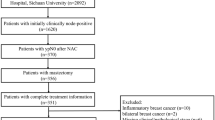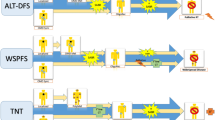Abstract
Cervical metastases from unknown primary tumors are rare and no clear therapeutic options are available. This study was performed to assess the efficacy and safety profiles of induction chemotherapy followed radiotherapy in patients with cervical lymph node metastases from unknown primary cancer. Patients with histological diagnosis of cervical lymph-node metastasis from carcinoma with an unknown primary cancer underwent induction chemotherapy followed by radiotherapy. All patients had squamous cell carcinoma. Induction chemotherapy consisted of 3–4 cycles every 3 weeks of docetaxel (day 1.70 mg/m2) and cisplatin (day 1.75 mg/m2). Radiation therapy (RT) was started with in 10 weeks of the last cycle of chemotherapy, and it was administered 5 days per week. It was given in daily fractions of (1.8) Grays (Gy) of 2 Gy and the total dose to the primary tumor was 70–74 Gy. Neck dissection was reserved for residual disease after definitive radiotherapy. Overall survival, recurrent free survival, and locoregional control were calculated using the Kaplan–Meier method. Twenty one patients with an unknown primary cancer underwent induction chemotherapy and radiotherapy. After induction chemotherapy, 6 patients achieved CR and 8 patients achieved PR. The overall response rate after radiation, was 90.4 % (19 of 21 patients). Neutropenia and infection were the most common grade 3–4 adverse event during induction chemotherapy. Mucositis and dermatitis were the most common grade 3–4 toxicities during radiotherapy. With a median follow-up of 50.6 months, the estimated 2 years OS rates were 71 ± 6 %, respectively. The median OS was 42 months (95 % confidence interval CI 8–65 months). The recurrent-free survival rate at 2 years was 57 %, respectively. In the patients with responder to induction chemotherapy, superior relapse free survival and overall survival rate observed. No occurrence of primary cancer was observed during the follow-up period. Induction chemotherapy followed RT for unknown primary cancer has provided good overall and disease-free survival in all the patients with an acceptable rate of complications. The use of induction chemotherapy and radiation therapy for more advanced disease led to good clinical results with reasonable toxicities.

Similar content being viewed by others
References
Grau C, Johansen LV, Jakobsen J et al (2000) Cervical lymph node metastases from unknown primary tumours: results from a national survey by the Danish Society for Head and Neck Oncology. Radiother Oncol 55:121–129
Friesland S, Lind MG, Lundgren J et al (2001) Outcome of ipsilateral treatment for patients with metastases to neck nodes of unknown origin. Acta Oncol 40:24–28
Sinnathamby K, Peters LJ, Laidlaw C et al (1997) The occult head and neck primary: to treat or not to treat? Clin Oncol (R Coll Radiol) 9:322–329
Pignon JP, Bourhis J, Domenge C et al (2000) Chemotherapy added to locoregional treatment for head and neck squamous-cell carcinoma: three meta- analyses of updated individual data. MACH-NC Collaborative Group, meta- analysis of chemotherapy on head and neck cancer. Lancet 355:949–955
CohenEE Lingen MW, Vokes EE (2004) The expanding role of systemic therapy in head and neck cancer. J Clin Oncol 22:1743–1752
Mendenhall WM, Amdur RJ, Palta JR (2006) Intensity-modulated radiotherapy in the standard management of head and neck cancer: promises and pitfalls. J Clin Oncol 24:2618–2623
Argiris A (2005) Induction chemotherapy for head and neck cancer: will history repeat itself ? J Natl Compr Cancer Netw 3:393–403
Jereczek-Fossa BA, Jassem J, Orecchia R (2004) Cervical lymph node metastases of squamous cell carcinoma from an unknown primary. Cancer Treat Rev 30:153–164
Reddy SP, Marks JE (1997) Metastatic carcinoma in the cervical lymph nodes from an unknown primary site: results of bilateral neck plus mucosal irradiation vs. ipsilateral neck irradiation. Int J Radiat Oncol Biol Phys 37:797–802
Forastiere AA, Goepfert H, Maor M et al (2003) Concurrent chemotherapy and radiotherapy for organ preservation in advanced laryngeal cancer. N Engl J Med 349:2091–2098
Denis F, Garaud P, Bardet E et al (2004) Final results of the 94-01 French Head and Neck Oncology and Radiotherapy Group randomized trial comparing radiotherapy alone with concomitant radiochemotherapy in advanced-stage oropharynx carcinoma. J Clin Oncol 22:69–76
Brizel DM, Albers ME, Fisher SR et al (1998) Hyperfractionated irradiation with or without concurrent chemotherapy for locally advanced head and neck cancer. N Engl J Med 338:1798–1804
Wendt TG, Grabenbauer GG, Rodel CM et al (1998) Simultaneous radiochemotherapy versus radiotherapy alone in advanced head and neck cancer: a randomized multicenter study. J Clin Oncol 16:1318–1324
Haddad RI, Shin DM (2008) Recent advances in head and neck cancer. N Engl J Med 359:1143–1154
Brockstein B, Haraf DJ, Rademaker AW et al (2004) Patterns of failure, prognostic factors and survival in locoregionally advanced head and neck cancer treated with concomitant chemoradiotherapy: a 9-year, 337-patient, multi-institutional experience. Ann Oncol 15:1179–1186
Nieder C, Ang KK (2002) Cervical lymph node metastases from occult squamous cell carcinoma. Curr Treat Options Oncol 3:33–40
Harper CS, Mendenhall WM, Parsons JT et al (1990) Cancer in neck nodes with unknown primary site: role of mucosal radiotherapy. Head Neck 12:463–469
Haigentz M Jr, Cohen EE, Wolf GT et al (2012) The future of induction chemotherapy for head and neck squamous cell carcinoma. Oral Oncol 48:1065–1067
Strojan P, Haigentz M Jr, Bradford CR et al (2012) Chemoradiotherapy versus total laryngectomy for primary treatment of advanced laryngeal squamous cell carcinoma. Oral Oncol 49:283–286
Hafkamp HC, Manni JJ, Haesevoets A et al (2008) Marked differences in survival rate between smokers and nonsmokers with HPV 16-associated tonsillar carcinomas. Int J Cancer 122:2656–2664
Perri F, Ionna F, Muto P et al (2013) Induction docetaxel-cisplatin followed by extended-field radiotherapy in patients with cervical metastases from unknown primary carcinoma. Anticancer Res 33(3):1135–1139
Author information
Authors and Affiliations
Corresponding author
Rights and permissions
About this article
Cite this article
Seol, Y.M., Choi, Y.J., Lee, B.J. et al. Induction Chemotherapy Followed by Radiotherapy in Patients with Cervical Lymph Node Metastases from Unknown Primary Carcinoma. Indian J Otolaryngol Head Neck Surg 67 (Suppl 1), 74–78 (2015). https://doi.org/10.1007/s12070-014-0773-8
Received:
Accepted:
Published:
Issue Date:
DOI: https://doi.org/10.1007/s12070-014-0773-8




